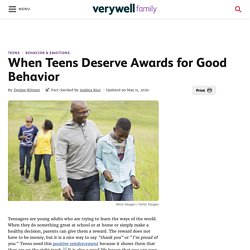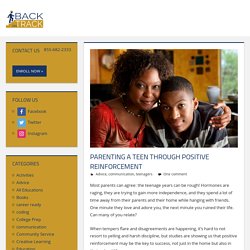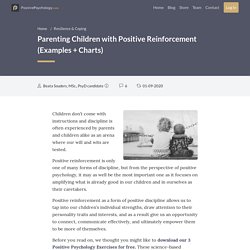

But as parents, we have to ensure that we are providing the proper platforms for them to be able to acknowledge on the actions done.
Let us take a look at reinforcements and punishments as one of the strategies to promote learning for our children.
Reinforcement versus Punishment Chart. Positive Reinforcements. Negative Reinforcements. Positive and Negative Punishments. Skinner’s Operant Conditioning: Rewards & Punishments. Positive vs Negative Reinforcement in ONE Minute. Positive and negative punishment. How to Reward Your Teen for Good Behavior. Teenagers are young adults who are trying to learn the ways of the world.

When they do something great at school or at home or simply make a healthy decision, parents can give them a reward. The reward does not have to be money, but it is a nice way to say "thank you" or "I'm proud of you. " Teens need this positive reinforcement because it shows them that they are on the right track.1 It is also a good life lesson that you can pass on: good things happen to good people. Parenting A Teen Through Positive Reinforcement - Back On Track. Most parents can agree: the teenage years can be rough!

Hormones are raging, they are trying to gain more independence, and they spend a lot of time away from their parents and their home while hanging with friends. One minute they love and adore you, the next minute you ruined their life. Can many of you relate? When tempers flare and disagreements are happening, it’s hard to not resort to yelling and harsh discipline, but studies are showing us that positive reinforcement may be the key to success, not just in the home but also in their school life. We’ve all heard the saying, “The one who is hardest to love needs love the most.” Parenting Children with Positive Reinforcement (Examples + Charts)
Children don’t come with instructions and discipline is often experienced by parents and children alike as an arena where our will and wits are tested.

Positive reinforcement is only one of many forms of discipline, but from the perspective of positive psychology, it may as well be the most important one as it focuses on amplifying what is already good in our children and in ourselves as their caretakers. Positive reinforcement as a form of positive discipline allows us to tap into our children’s individual strengths, draw attention to their personality traits and interests, and as a result give us an opportunity to connect, communicate effectively, and ultimately empower them to be more of themselves.